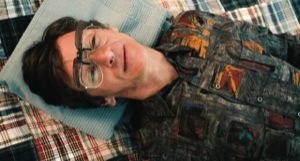
If you’ve been reading my reviews, you’ll know that I tend to dislike movies about people with disabilities, maladies or unfortunate circumstances overcoming their problems, usually with swells of mediocre music and a cheap plea for tears.It’s not that I don’t like seeing people succeed when the odds are more likely that they’ll fail; rather it’s that the movies are usually obvious and formulaic.
I don’t like knowing the ending of the movie before the opening credits are finished.
And that’s just one of the reasons I did like The Sessions, which focuses on a man who suffered severe polio as a child and was left unable to move any of his muscles below his neck.
By the end of the credits, we know that despite having to spend most of his life in an iron lung and unable to move, he graduated from Berkeley with a degree in English and was a working poet and journalist.
So, now what? He wants to have sex.
John Hawkes plays Mark O’Brien, an actual person who died in 1999 at the age of 49; the movie takes place when Mark was 38, in 1988.
The film opens with Mark asking his new priest Father Brendan, played by William H. Macy, whether it would be a sin to fire his gruff, tough aide just because he didn’t like her.
With the Father’s approval, he does and hires a gorgeous young student, who he falls in love with. Clearly enamored with him but unable to feel the same way, she quits.
And shortly thereafter, an editor calls Mark and asks if he would be willing to write an article about sex and the disabled. Reluctant and embarrassed, he proceeds to research the article, his aides Vera (Moon Bloodgood) and Rod (W. Earl Brown), pushing his wheeled bed around town and helping him record interviews.
The article leads him to learn about sex therapists and then sex surrogates, who therapeutically have sex with their clients who have sexual problems, like impotence, anxiety or intimacy issues.
A virgin who has never been romantically kissed, Mark desperately wants to have sex to feel whole and to feel like a man. He asks Father Brendan for permission. He hems and haws before looking up at a crucifix and saying, “I think he’ll give you a pass on this one.”
The surrogate is Cheryl, and she is played by Helen Hunt, who proves that winning an Oscar for As Good As It Gets was not a fluke.
A serious professional, Cheryl makes it clear that she is not a prostitute, that they can only have six sessions and that she is very private person. She intimidates and terrifies Mark, but as their relationship deepens over the sessions, he develops a crush.
Even within the very odd plot, The Sessions is somewhat formulaic, and the obvious, treacly score doesn’t help. But Ben Lewin’s script and the wondrous performances by Hawkes and Hunt will most likely get the movie onto a number of “Best of the Year” lists.
Hawkes has a great character to work with; Mark is sweet, snarky, very smart and very funny, and it is not surprising that so many people become attached to him. He’s also ridden with guilt for his illness and disability, and prone to feeling sorry about himself, though it helps that he does it with such humor.
Hawkes, one of America’s great character actors, is able to communicate all of this with subtlety, using only a quiet voice and facial expressions.
Hunt doesn’t have the same degree of difficulty, but she also doesn’t have a physical transformation to fall back on. She is a professional doing her job, and she is both stern and soft, exhibiting kindness in frustration, both with Mark and in the surprise of her attachment to him.
Hunt, who bares everything both emotionally and physically, does her best and bravest work in The Sessions. She has certainly overcome being best known for the mediocre sitcom Mad About You.
MOVIE REVIEW
The Sessions
Written and Directed by Ben Lewin
Starring John Hawkes, Helen Hunt and William H. Macy
Rated R
At Landmark Hillcrest











